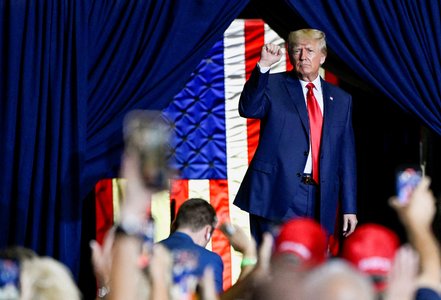Russian President Putin responded to the success of Ukraine’s counter-offensive by calling up 300,000 reservists, ordering a referendum on joining Russia in four occupied regions, and threatening a nuclear response if Ukraine’s advance continues. At the United Nations, President Biden rebuked Putin by name and called out Russia’s “outrageous acts” and shameless violation of the U.N. charter.
Clip: How Western aid to Ukraine is pushing Putin to make desperate moves
Sep. 23, 2022 AT 5:25 p.m. EDT
TRANSCRIPT
Notice: Transcripts are machine and human generated and lightly edited for accuracy. They may contain errors.
Yamiche Alcindor : Now, this week, there was also big headlines on the international front. On Wednesday, Russian President Vladimir Putin responded to a successful counteroffensive by Ukraine. In a televised speech to the Russian people, Putin announced the mobilization of 300,000 troops. He also hinted at his willingness to use nuclear weapons if Ukraine continues to retake territory he believes is now part of Russia.
Vladimir Putin (through translator) : In the event of a threat to the territorial integrity of our country and to defend Russia and our people, we will certainly make use of all weapons systems available to us. This is not a bluff.
Yamiche Alcindor : Later that day, in a speech to the United Nations General Assembly, President Biden addressed Putin's threats. He rebuked him by name and called out Russia's -- quote -- "outrageous acts."
He also affirmed the U.S.' commitment to Ukraine's independence.
Joe Biden : The United States wants this war to end on just terms.
Ukraine has the same rights that belong to every sovereign nation. We will stand in solidarity with Ukraine. We will stand in solidarity against Russia's aggression, period.
Yamiche Alcindor : So, Vivian, I want to start with you.
You have been back and forth to Ukraine. We had you on the show several times to talk about it. Tell me a little bit about where the war stands right now, especially how Ukraine has been able to take back some territory and really make gains in this fight, and, of course, Russia seeing -- seeming like it's really struggling here, at least based on the reporting.
Vivian Salama : Well, the simple way to put it is that Western assistance is working.
Ukrainian forces have made some significant and some surprising gains in recent weeks. And that is largely due to the fact that the U.S. and its allies in Europe and elsewhere have been pouring billions and billions of dollars of weapons into Ukraine.
This is why the Ukrainian military of today is leaps and bounds better than the Ukrainian army that took on Russian forces in 2014. There's absolutely no comparison. And, especially as of late, we have provided these long-range missiles that so many people at home that are watching probably have heard of.
These have been a game-changer in these battles. And so they have been able to capture -- recapture approximately territory the size of Connecticut. But it's still a slog. The Russian forces still hold a large chunk of territory in Ukraine. And now, as you said, President Putin doubling down, saying that he wants to hold these sham referendums, as they're called, because he wants to justify, essentially, the Russian territorial claims over that territory.
But a lot of observers looking at this and looking at the fact that he's now trying to call up another 300,000 conscripts and saying, these are desperate moves. They're not moves of someone who is doubling down because he thinks that they're winning and he wants to kind of seal the deal. These are moves by someone who's getting desperate.
And all signs are pointing to that. The last couple of days have been really interesting in Russia to watch. We have seen men of conscription age fleeing the country by land, by air, anything they can. There was a spike in Google searches for how to break an arm because young men were afraid to...
Yamiche Alcindor : Wow.
Vivian Salama : Reportedly afraid to sign up for the military.
And a lot of these young men know that they're going into this fight essentially to their death, because of the fact that the Ukrainian forces are starting to make gains. And that is starting to get back to people in Russia, despite the fact that they have such a grip on the media.
And so that is where things stand. And it's a long way to go for the Ukrainians and for the Russians, but the Ukrainians are making gains. And that's something that certainly people at the U.N. this weekend and Washington are cheering.
Yamiche Alcindor : And, Peter, you lived in Russia.
I wonder what you make of Putin's strategy here. And I'm also really interested in the fact that you have been talking to Russians who will say that there hasn't been a lot of talk about the war on TV. But we're now seeing arrests for people who are protesting Putin essentially trying to draft people into the military, so that he can try to continue to fight this war.
Peter Baker : I think that's exactly right. And Vivian puts her finger on an important point here.
Up until now, he has basically tried to shield the Russian public from this idea of a war, doesn't even allow them to call it a war. It's a special military operation. And I talked to a friend of Moscow last week who said: "Yes, nobody here would even tell you they know much about the war at all."
I talk to people and they say, what war? I ask them, what about this? They don't know anything about it? He has -- he tried to pretend, in effect, that this wasn't happening. Well, when you call up 300,000 men -- and it may be, in fact, more -- and you're reaching into these villages, into families, and you're taking away their husbands and sons and fathers, that has a different impact.
That means the war is actually coming home to them. And that's a danger for President Putin, I think. That's a point where people are starting to ask the question, well, why are we doing this? My colleagues talked to the wife of a 38-year-old man, a father of five, who was suddenly put on a bus, has no military experience, not a member of the reserves, being shipped off for what will be 15 days worth of training to be sent into a war, basically cannon fodder.
That is not a prescription for victory. That is not, in fact, a sign of a healthy government, by the way. And that brings up questions about Putin's own staying power at some point. And these protests may only be the beginning of something larger.
And then there's the other side of the equation.
Yamiche Alcindor : Yes.
Peter Baker : These are the people who are against the war.
The other side are the hard-liners, who think that Putin has screwed it up from the other side, that he's been lost a war that they should have won and embarrassed the country on the international stage.
Yamiche Alcindor : Wow.
Nancy, I want to bring you in. You were reporting, of course, at the United Nations. We did some research, and we realized that, in late February, you asked President Biden about how worried Americans should be about nuclear threats and nuclear war. And at the time, he said no.
What's your sense of the White House's thinking of that threat in particular, and then as the White House thinking about all these new developments?
Nancy Cordes : They don't seem to be that concerned about some of this new rhetoric coming from Vladimir Putin.
They say, he has been talking this way all along. He's -- he's always bellicose. He's always making these sort of veiled threats. They don't see anything in the intelligence that leads them to believe that he's any more likely to unleash nuclear weapons now than he was six months ago, when I asked President Biden that question.
It doesn't mean that they're not concerned at all about the prospect. Any time you have got world powers all focusing in one area, the possibility for some kind of misunderstanding and some kind of escalation always has to be a concern. But they don't see anything right now that leads them to be more worried than they were a month or two ago.
Yamiche Alcindor : And what are you hearing about President Biden's thinking when it comes to aid to Ukraine? Obviously, the United States has given a lot of aid to Ukraine, but, also, the American public, there are other things on their minds.
Nancy Cordes : Right.
Yamiche Alcindor : And this could become a liability.
Nancy Cordes : Well, they argue it's working.
And, in fact, they have sped up their pace of aid. Every couple of weeks now, we're seeing a new tranche of weaponry, artillery going to the Ukrainians, because they argue, look, we're turning the tide of the war here with the material that we're giving them. And they're not seeing a lot of pushback from members of Congress, particularly at a moment where we're heading into October, and most of these members are focused on their races back home.
Yamiche Alcindor : And, Vivian, I want to come to you.
We talked to you, our producer talked to you about sort of the enthusiasm and potential for waning supportive among Americans. What are you hearing there? Because, obviously, this aid has been critical to Ukraine.
Vivian Salama : There is a growing concern, Yamiche, on the Hill that House Republicans are starting to find that their constituents want other priorities.
They see billions of dollars going to Ukraine, and, all the while, they can't afford gas, they can't afford groceries. And so they are coming under pressure, increasingly so.
And I have spoken to dozens now of moderate Republicans in the House who tell me...
Yamiche Alcindor : Yes.
Vivian Salama : ... that they're just concerned that, at this, at some point, and perhaps after the election, and especially if Republicans gain control of the House, that there's going to be a lot more pushback for that -- those aid packages to Ukraine.
And so that is definitely something to watch as we go into the coming months.
Yamiche Alcindor : It's certainly something to watch and definitely top of mind when I talk to White House officials, thinking about sort of what the American public thinks about a war that has been on -- in headlines, but also a war that is very much sort of taking away resources, in some people's minds, at least, from other things that the United States can be spending its money on.
So, thank you so much to our panel for joining us and for sharing your reporting.
FROM THIS EPISODE


Clip: Can Trump survive investigations as legal trouble accumulates?


Full Episode: Washington Week full episode, September 23, 2022

© 1996 - 2026 WETA. All Rights Reserved.
PBS is a 501(c)(3) not-for-profit organization
